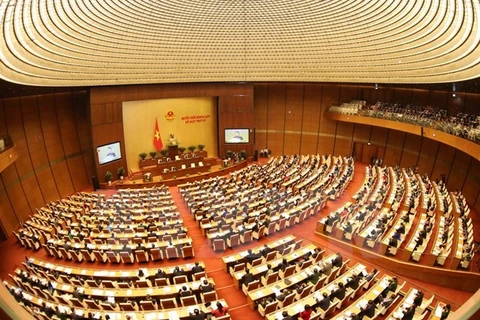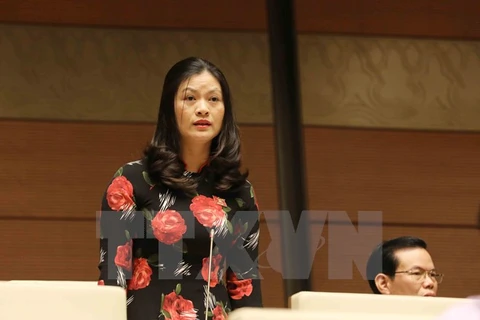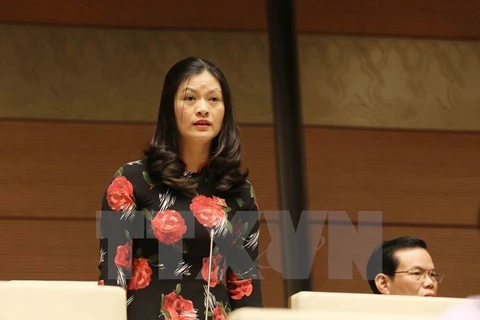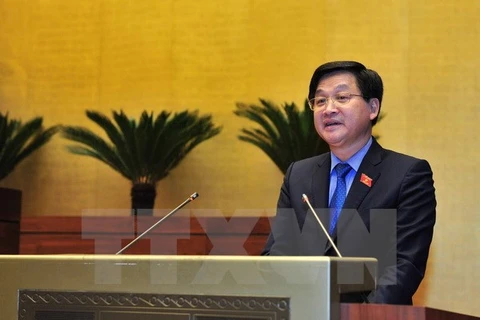Hanoi (VNA) — Entering the second day of discussions on anti-corruption measures, National Assembly (NA) deputies November 7 acknowledged the judiciary branch’s recent attempts to improve, however the quality and efficiency still has not met with voters’ expectations.
NA Deputy Truong Trong Nghia of the Ho Chi Minh City delegation said bureaucratic tardiness was “a dreadful thing” for the public and it bogged down the growth of the country.
“There are very simple cases which last forever, documents already signed by authorities long ago but people are made to wait weeks before they can get their hands on them, forcing people to resort to bribes or middlemen to facilitate the process,” he said.
Disputing Nghia’s remarks that corruption in the judicial is “prevalent,” Mai Khanh, a deputy from the northern province of Bac Ninh called such remarks “groundless.”
“There’s no denying that our judicial system is flawed, what with weak infrastructure and equipment, limited capacity of judicial workers. But, in 500,000 cases that the courts handle each year, and hundreds of thousands of prosecutions, how can one say for sure the rate of cases with corruption?” Khanh argued.
Khanh said that exaggerated praise is not recommended, but one should also refrain from unreasonable criticism.
Citing reports by the Ministry of Public Security, Procuracies and Courts, deputy Nguyen Huu Cau also lauded efforts by relevant authorities to keep crimes in the country this year lower than in 2016 – the number of social order crime cases was down by 5.48 percent, while organised crimes and crimes involving weapons fell by 45.86 and 21.58 percent, respectively.
Nguyen Manh Cuong, a deputy from Hanoi, argued for a platform that allows people to rate the service delivery quality of judicial agencies.
Cuong also said in the era of ubiquitous social media, the existence of news about judicial corruption could cause public distrust if the judicial sector fails to provide proper explanations.
“The judicial sector needs to be more proactive in its efforts to account for issues,” he said.
Nguyen Mai Bo, NA deputy from the An Giang province delegation, said amongst civil servants in the country, court staff – especially judges – are the most scrutinised. “Before the verdict is handed down, judges are monitored by prosecutors and lawyers, not including the press in public trials. In addition, judges are watched over by various procuracies as well as higher courts indefinitely,” he said.
Defending the judicial branch against allegations of rampant corruption and other moral failings, Bo cited data showing that only 0.45 percent of cases are annulled due to ‘subjective errors’ on the judges’ part, and 1.09 percent due to courts’ errors.
Wrongful verdicts
Prosecutor General Le Minh Tri of the Supreme People Procuracy gave his account on the NA’s queries on miscarriage of justice.
Tri said that 2016, there were 70 cases of unjust sentences, and the judicial sector is set to bring this number down to 32 cases in this year.
The prosecutor general said that wrongful verdicts cannot be entirely avoided, but the important thing is that “judicial workers are brave enough to own up to their mistakes and deliver appropriate efforts to remedy the consequences, and try not to make the same mistakes again.”
Regarding questions on whether there is corruption in the judicial sector or in inspection and auditing work, Tri said this is “a difficult task” because if such people commit wrongdoings, “it would be hard to collect evidence against them.”
“However, no efforts would be spared in controlling and minimising [such wrongdoings] to ensure a transparent judicial system,” Tri said.
Speeding up serious corruption cases
Deputy Prime Minister Truong Hoa Binh delivered his report on the government’s anti-corruption efforts at the discussion, stating that despite the intensity of the “no-holds-barred” fight against corruption recently, the complexity of the situation hampers the effectiveness of the fight.
Binh admitted to several limitations of the anti-corruption fight such as slow introduction of “key” legislation, tardy revision of existing law, and ineffective asset recovery.
The Deputy PM said that in the future, the government will continue to review and amend existing laws on socio-economic management, especially in sectors where corruption could likely occur, as well as complete the draft amended law on anti-corruption and the amended law on complaints to submit to the NA.
Binh also promised that government agencies should be more transparent in bidding processes, giving and receiving gifts, accountability of leaders, and equitisation processes.
On November 7 afternoon, NA deputies discussed the settlement of complaints and denunciations by citizens this year.
According to reports from the Government, the NA Standing Committee and the National Assembly’s Law Committee, the number of complaints and denunciations has declined, but there have been more complicated cases where comprehensive solutions have not been found.
Reporting to the NA on actions taken in response to citizens’ complaints and denunciations in 2017, Government Inspector General Le Minh Khai said that the number of cases this year was lower than last year in all categories. However, many cases remained unsolved year after year, he said.
Deputies Le Minh Son from the southern province of Tien Giang and Ngo Duy Hieu from Hanoi both called for more regular and closer communications between officials and citizens to speed up the resolution of such cases.
According to the Government’s report, the number of land-related complaints accounted for 60.4 percent of the total, followed by housing problems with 11.7 percent.
Among denunciations, those relating to the administrative sector accounted for 62.3 percent, mainly denouncing officials and civil servants for violating laws on the land use management, engaging in fraud regarding finances, investments in basic construction and implementation of social policies.
Deputy Pham Tri Thuc from the central province of Thanh Hoa said shortcomings in land-related laws and policies had allowed the violations. He urged the Government to make major changes to land-related laws and also amendments to laws on denunciations and complaints.- VNA
NA Deputy Truong Trong Nghia of the Ho Chi Minh City delegation said bureaucratic tardiness was “a dreadful thing” for the public and it bogged down the growth of the country.
“There are very simple cases which last forever, documents already signed by authorities long ago but people are made to wait weeks before they can get their hands on them, forcing people to resort to bribes or middlemen to facilitate the process,” he said.
Disputing Nghia’s remarks that corruption in the judicial is “prevalent,” Mai Khanh, a deputy from the northern province of Bac Ninh called such remarks “groundless.”
“There’s no denying that our judicial system is flawed, what with weak infrastructure and equipment, limited capacity of judicial workers. But, in 500,000 cases that the courts handle each year, and hundreds of thousands of prosecutions, how can one say for sure the rate of cases with corruption?” Khanh argued.
Khanh said that exaggerated praise is not recommended, but one should also refrain from unreasonable criticism.
Citing reports by the Ministry of Public Security, Procuracies and Courts, deputy Nguyen Huu Cau also lauded efforts by relevant authorities to keep crimes in the country this year lower than in 2016 – the number of social order crime cases was down by 5.48 percent, while organised crimes and crimes involving weapons fell by 45.86 and 21.58 percent, respectively.
Nguyen Manh Cuong, a deputy from Hanoi, argued for a platform that allows people to rate the service delivery quality of judicial agencies.
Cuong also said in the era of ubiquitous social media, the existence of news about judicial corruption could cause public distrust if the judicial sector fails to provide proper explanations.
“The judicial sector needs to be more proactive in its efforts to account for issues,” he said.
Nguyen Mai Bo, NA deputy from the An Giang province delegation, said amongst civil servants in the country, court staff – especially judges – are the most scrutinised. “Before the verdict is handed down, judges are monitored by prosecutors and lawyers, not including the press in public trials. In addition, judges are watched over by various procuracies as well as higher courts indefinitely,” he said.
Defending the judicial branch against allegations of rampant corruption and other moral failings, Bo cited data showing that only 0.45 percent of cases are annulled due to ‘subjective errors’ on the judges’ part, and 1.09 percent due to courts’ errors.
Wrongful verdicts
Prosecutor General Le Minh Tri of the Supreme People Procuracy gave his account on the NA’s queries on miscarriage of justice.
Tri said that 2016, there were 70 cases of unjust sentences, and the judicial sector is set to bring this number down to 32 cases in this year.
The prosecutor general said that wrongful verdicts cannot be entirely avoided, but the important thing is that “judicial workers are brave enough to own up to their mistakes and deliver appropriate efforts to remedy the consequences, and try not to make the same mistakes again.”
Regarding questions on whether there is corruption in the judicial sector or in inspection and auditing work, Tri said this is “a difficult task” because if such people commit wrongdoings, “it would be hard to collect evidence against them.”
“However, no efforts would be spared in controlling and minimising [such wrongdoings] to ensure a transparent judicial system,” Tri said.
Speeding up serious corruption cases
Deputy Prime Minister Truong Hoa Binh delivered his report on the government’s anti-corruption efforts at the discussion, stating that despite the intensity of the “no-holds-barred” fight against corruption recently, the complexity of the situation hampers the effectiveness of the fight.
Binh admitted to several limitations of the anti-corruption fight such as slow introduction of “key” legislation, tardy revision of existing law, and ineffective asset recovery.
The Deputy PM said that in the future, the government will continue to review and amend existing laws on socio-economic management, especially in sectors where corruption could likely occur, as well as complete the draft amended law on anti-corruption and the amended law on complaints to submit to the NA.
Binh also promised that government agencies should be more transparent in bidding processes, giving and receiving gifts, accountability of leaders, and equitisation processes.
On November 7 afternoon, NA deputies discussed the settlement of complaints and denunciations by citizens this year.
According to reports from the Government, the NA Standing Committee and the National Assembly’s Law Committee, the number of complaints and denunciations has declined, but there have been more complicated cases where comprehensive solutions have not been found.
Reporting to the NA on actions taken in response to citizens’ complaints and denunciations in 2017, Government Inspector General Le Minh Khai said that the number of cases this year was lower than last year in all categories. However, many cases remained unsolved year after year, he said.
Deputies Le Minh Son from the southern province of Tien Giang and Ngo Duy Hieu from Hanoi both called for more regular and closer communications between officials and citizens to speed up the resolution of such cases.
According to the Government’s report, the number of land-related complaints accounted for 60.4 percent of the total, followed by housing problems with 11.7 percent.
Among denunciations, those relating to the administrative sector accounted for 62.3 percent, mainly denouncing officials and civil servants for violating laws on the land use management, engaging in fraud regarding finances, investments in basic construction and implementation of social policies.
Deputy Pham Tri Thuc from the central province of Thanh Hoa said shortcomings in land-related laws and policies had allowed the violations. He urged the Government to make major changes to land-related laws and also amendments to laws on denunciations and complaints.- VNA
VNA
























